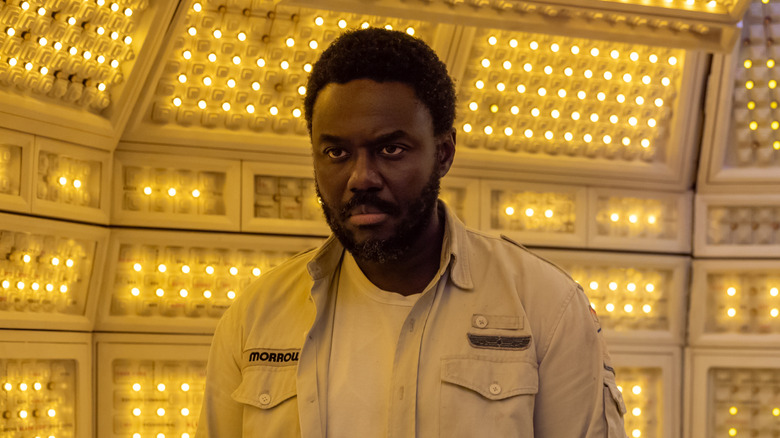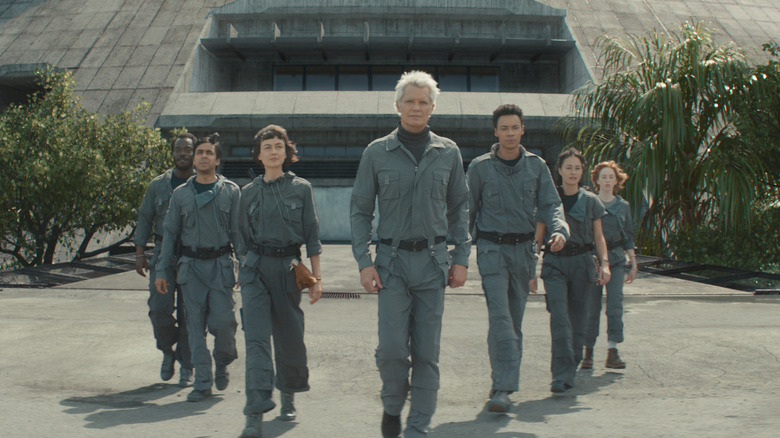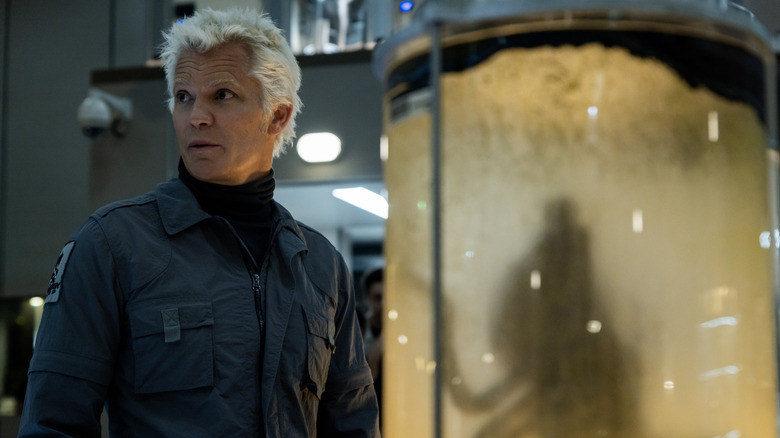Android, Hybrid, Or Cyborg? Alien: Earth's Synthetic Humans Explained
"Alien: Earth" spoiles follow.
Though it draws its name from an extraterrestrial species, the "Alien" franchise is often just as interested in synthetic life as it is in the biological world. This goes all the way back to the very first film, where a late twist reveals that Nostromo science officer, Ash (Ian Holm), was not only a no-good corporate spy for Weyland-Yutani, but an android.
Successive films returned to this idea of corporate-designed "synthetics" again and again, from Lance Henriksen's iconic Bishop character to Michael Fassbender's David in "Prometheus" and "Alien: Covenant." The latter is often used as a mouthpiece in the later Ridley Scott films for bigger thematic ideas around life, death, mythology, and what it means to be human. Now, the new FX series, "Alien: Earth," is putting a stronger focus on the philosophy around synthetic life than ever before.
The series centers around a secret research facility run by the Prodigy corporation, where terminally ill children have their consciousness uploaded into synthetic adult bodies. These characters, dubbed "hybrids," present a third form of synthetic life to the pre-existing cyborgs and androids. The opening text of the series' first episode explains the differences between the groups in basic terms — a cyborg is a human who has received significant cybernetic augmentations, an android is a fully synthetic being created in a lab, but with sentience, and a hybrid is a human mind placed into an android body.
Cyborgs and hybrids are both new in Alien: Earth
"Alien: Earth" spends the majority of its first two episodes exploring the hybrids at Prodigy, but the concept of cyborgs is just as new to the franchise. The films have mainly dealt with synthetics, but the beginning of the new series also introduces a cyborg character — Weyland-Yutani employee and Maginot security officer Morrow (Babou Ceesay). The opening scenes show that the ship has both a synthetic and a cyborg onboard, but curiously enough, it's Morrow who's tasked with ensuring the safe arrival of the various alien lifeforms on board to Earth. The show takes place just a few years before "Alien" in the franchise timeline, so you might expect the synthetic to be the one taking secret protocol instructions from the corporate overlords, but the show changes things up.
There's a lot we still don't know about Morrow, but he clearly has some internal struggles with his own humanity. In episode 2, we see him upload massive amounts of data to his brain, revealing that both his mind and body are augmented. How people are selected for this process, and the full ramifications of it, remain vague, but it's obvious from how Morrow treats regular humans that he doesn't consider himself one of them anymore either.
The hybrids and cyborgs seem to have more in common than the true synthetics do with either, as they both begin as biological humans. However, Prodigy seems to believe that the hybrid mind-transfer tech is the true future due to the immortality of a fully synthetic body.
Alien: Earth seems to be interested in what makes us human
The opening text of "Alien: Earth" episode 1 states that, "In the future, the race for immortality will come in 3 guises," referring to the synthetic androids, cyborgs, and hybrids. It also says that "whichever technology prevails will determine what corporation rules the universe," setting the stakes pretty high. Throughout the opening episodes, we see a number of interactions between all three human variants and regular humans. On the Maginot, crew members distrust the ship synth, and Morrow as more of an equal, but there's still obvious anti-cyborg sentiment. He pays those feelings back later, after telling a pair of Prodigy soldiers begging for help, "I'm not your brother."
The children at the Neverland facility are largely overseen by Kirsh (Timothy Olyphant), a synthetic who seems to care for them in his own way while also despising his human masters in private. What world would there be for an android, though, when you can put any human mind into an equally intelligent and powerful body?
These are fascinating questions, if not the kind that loyal fans of the "Alien" movies may have expected going in. So far, the show has been a lot more classical sci-fi in the Asimov/Clarke/Bradbury model than a proper sci-fi horror story. That could turn off some viewers, but it could also help "Alien: Earth" stand out against the larger franchise and establish a following of its own, provided it sticks the landing.


